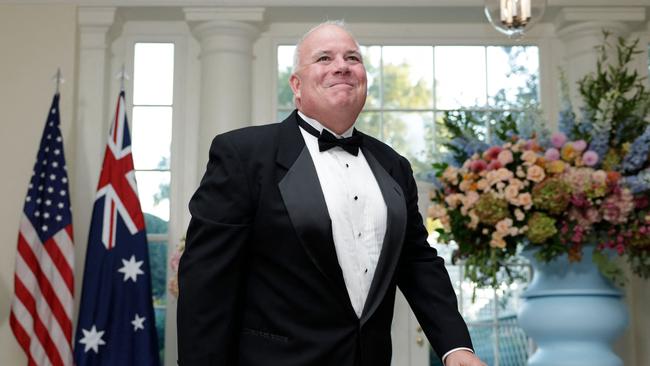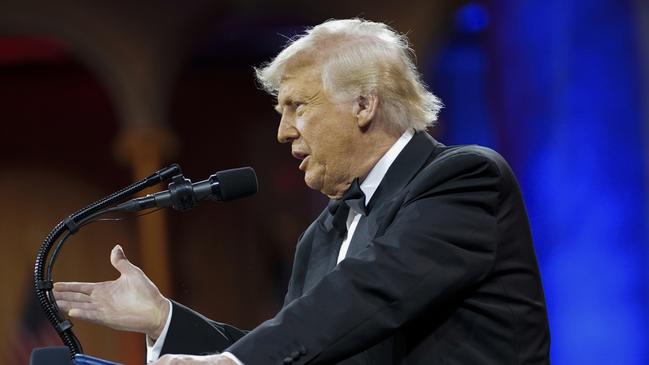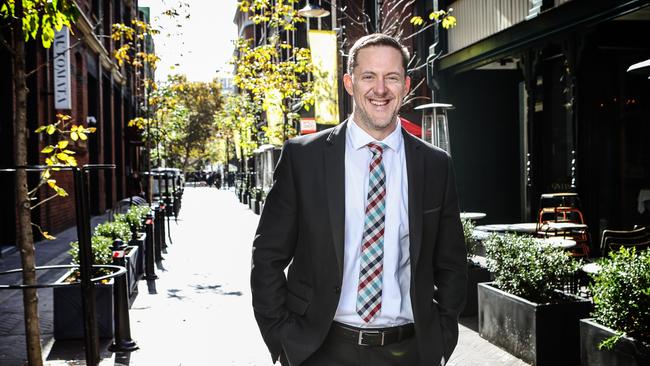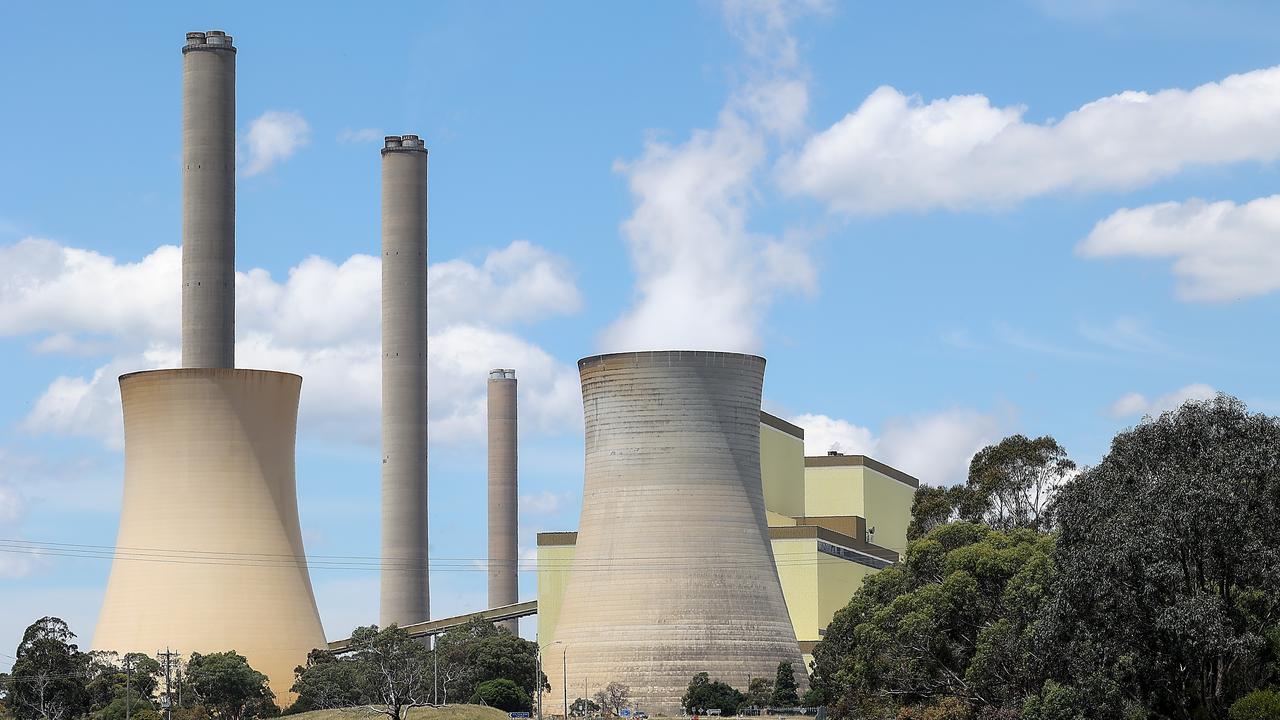Australians reduced to watching in horror at the tit-for-tat tariffs war that has CSL investors on edge
CSL is in the crosshairs of Donald Trump’s tariff regime after the President declared pharmaceuticals were not immune.

Australia’s economy faces a material hit from the escalating US-China trade war as fears grow of a global recession with a mooted tariff on pharmaceuticals unsettling investors in vaccine and blood products supplier CSL.
With nearly $50bn wiped from the ASX as US tariffs including a 104 per cent hike for Chinese goods took effect, economists said Australia faced a deeper slowdown with the global trade war showing no sign of easing.
The imposition of yet another tariff by the US on China and the prospect of retaliation by Beijing was a “material step” in terms of its impact on the world economy, KPMG economist Brendan Rynne said.
Markets were now bracing for whether China would retaliate with another 50 per cent tariff on US goods in addition to its earlier 34 per cent charge imposed only last week.
“If there is a step up in China retaliating with a 50 per cent extra tariff this will have a more significant negative effect on world trade,” he said.
“We need cooler heads to prevail, otherwise this is going to get out of hand and be very detrimental to the world economy.”

KPMG had been expecting Australia’s economic growth would be sliced by about 0.3 per cent from the trade wars before the latest developments.
The potential for a second round of retaliation from China against the US would mean a “more substantial” negative result for Australian and global growth.
“The two largest economies have been effectively beating each other up and have now taken a further step in beating each other up,” Mr Rynne said.
“If the latest step (by the US) is fully reciprocated, the consequential impact will be more severe than anything we have seen.”
The likelihood of a recession in Australia had “increased materially” since President Trump’s “Liberation Day” move, Morningstar’s market strategist Lochlan Halloway said.
“The latest escalation – an increase of the tariff rate on US imports of Chinese goods to 104 per cent – is more unwelcome news for Australia’s economy,” he said. “We also can’t rule out further retaliation from China.”
CSL shares tumbled on Wednesday after President Trump flagged the imminent introduction of a “major tariff on pharmaceuticals’’.
CSL told the market on April 3 that President Trump’s early-stage pronouncements on tariffs indicated that pharmaceutical products would be carved out of any tariff measures.
However in an apparent broadside at Australia’s Pharmaceutical Benefits Scheme, President Trump has expressed displeasure at some countries setting the prices for drugs.
“We are going to tariff our pharmaceuticals and once we do that they’re going to come rushing back into our country because we’re the big market,’’ he said during a speech at Republican Congressional Committee dinner.

“We’re going to be announcing very shortly a major tariff on pharmaceuticals and when they hear that they will leave China, they will leave other places … and they’re going to be opening up their plants all over the place.’’
Mr Trump accused drug manufacturers of charging up to 10 times more for their drugs in the US market, as opposed to in the UK for example.
“Something that sells for $88 in London sells for $1300 here, made in the same factory by the same company, and that’s over,’’ he said.
“What they don’t tell is that these other countries are smart, they say you can’t charge more than $88 otherwise you can’t sell your product.’’
CSL shares fell 5 per cent on the news, closing down $12.18 at $233.62. The stock is down almost 17 per cent year to date.
While CSL collects plasma in the US and manufactures a significant amount of products there, it also has manufacturing facilities in Switzerland, Germany, China, the UK and Australia.
UTS Australia China Relations Institute director James Laurenceson, said: “The Trump administration seems to imagine that because China exports more to the US than it imports, this gives it leverage and escalation dominance.”
He said exports to the US now only account for around 2.5 per cent of China’s GDP. “The US is simply not as important to China’s economic prospects as it was a decade or two ago.”
KPMG said its modelling did not see Australia going into a recession as a result of the latest moves, but warned its short-term growth outlook would become “much more severe”.
“The solution is for cooler heads to prevail and step back from this,” Mr Rynne said. “Hopefully there are people on both sides who are coming to the conclusion that they need to do something to defuse the situation.”
The latest developments further question China’s ability to deliver its short-term growth targets which are already under pressure and will have further implications for its trading partners including Australia.

Small business in Australia was also in the “firing line” from the US-China trade war, according to the chief executive of the Council of Small Business Organisations Australia, Luke Achterstraat.
He said the higher tariffs would flow on to small businesses as they imported raw materials and technology and had no market power over prices.
“It will have a significant impact on import costs for things like raw materials, machinery and technology that are not produced in Australia, potentially sending operating costs further north,” he said. “Global economic instability doesn’t just impact big business – the domestic uncertainty hurts the small businesses in every community in Australia relies upon. Australia is a small open trading economy and because of what’s happening globally, supply and input costs will disproportionately affect small businesses.
“They simply don’t have economies of scale or market power over their supply chains to compete,” he said.
“Australia’s small businesses are in the firing line here – they are more prone to shocks and are already vulnerable. “
Mr Achterstraat called on the federal government to support the sector by cutting the company tax rate for small business from 25 per cent to 20 per cent.
“This will enable them to build confidence, reinvest and innovate,” he said.
Additional reporting: Cameron England





To join the conversation, please log in. Don't have an account? Register
Join the conversation, you are commenting as Logout